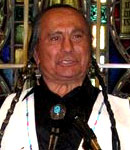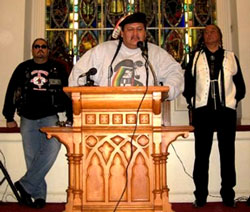Lakota Indians cancel treaties with U.S. gov’t
By Ashahed M. Muhammad -Asst. Editor- | Last updated: Jan 17, 2008 - 1:20:00 PMWhat's your opinion on this article?
- Message from Russell Means to Readers of The Final Call:
Thank you for supporting Lakotah sovereignty! (FCN)

Russell Means
|
“We are no longer citizens of the United States,” said longtime indigenous rights activist Russell Means at a press conference at Plymouth Congregational Church in Washington, D.C. on Dec. 19. “We offer citizenship to anyone provided they renounce their U.S. citizenship,” said Mr. Means.
The Lakota delegation delivered signed documents to the U.S. State Department informing officials of the decision to formally declare sovereignty from the United States as a result of its genocidal assault on the political, cultural and economic freedom of the Lakota Nation. The geographic area making up what will be called the Republic of Lakota covers portions of northern Nebraska, half of South Dakota, one-quarter of North Dakota, 20 percent of Montana and 20 percent of Wyoming. Mr. Means used the term “apartheid” to describe the dire conditions facing the Lakota Nation.

Canupa Gluha Mani, leader of the Lakota Strongheart Warrior Society, speaks at press conference.
"We are no longer citizens of the United States. ... We offer citizenship to anyone provided they renounce their U.S. citizenship." -Russell Means Lakota Freedom Delegation |
The life expectancy of Lakota men is less than 44 years; 97 percent of the Lakota people live below the poverty line. The Lakota infant mortality rate is 300 percent higher than the national average. The tuberculosis rate on Lakota reservations is 800 percent higher than the national average; cervical cancer is 500 percent higher than the national average; the rate of diabetes is 800 percent higher than the national average
The unemployment rate on reservations is over 85 percent with the median income between $2,600 to $3,500 per year. One-third of the homes on reservations lack clean water and 40 percent of the homes lack electricity. In addition, alcoholism affects 8 in 10 Lakota families with rates of drug abuse and suicide increasing.
Naomi Archer, communications liaison for the Lakota Freedom Delegation, said many other indigenous nations and political independence movements in North America, South America, Europe and Africa have reached out in solidarity and support. A portion of the document delivered to the State Department read, “Should the United States and its subordinate governments choose not to act in good faith concerning the rebirth of our nation, we hereby advise the United States Government that Lakota will begin to administer liens against real estate transactions” within the five state area of what will be called the Republic of Lakota.
A history of broken treaties
The first contacts between the Lakota and the United States began after what is commonly known as the “Louisiana Purchase” in 1803. It is estimated that the United States bought 530 million acres of land from France for $15 million. Part of this sale included land already inhabited by the Lakota. They never consented to the sale of any of their land.
As U.S. citizens began to move into the area in large numbers, further encroaching upon the Lakota territory, tensions increased and violence broke out, leading to the Fort Laramie Treaty of 1851. In that treaty, the U.S. agreed to respect the independence and sovereignty of the Lakota Nation. After repeated violations, another conflict known as the “Red Cloud War” broke out. After being defeated, the U.S. asked for another treaty which became the Fort Laramie Treaty of 1868. According to the terms of this second treaty, the U.S. was to abandon Lakota territories including the U.S. military forts that they built, and they were to keep U.S. settlers out of the Lakota territories.
Again, the U.S. violated the agreement by taking land and resources, setting up commerce routes and establishing railroads through the land belonging to the Lakota. In 1871, the U.S. decided to no longer sign treaties with the indigenous people. In 1874, led by George Custer, the U.S. conducted a military invasion of the Black Hills area of the Lakota territories establishing a military occupation of the land.
Strongheart Warrior Society leader Canupa Gluha Mani said local governments as well as the federal government have always collaborated to control indigenous lands and people. It is time for all oppressed people to throw off the chains of their colonial masters, he said.
“You don’t need colonial practices anymore. Return to the life way that you once had prior to signing treaties with this government. Enough is enough! They’ll probably kill me for talking like this, but I’m tired of being backed into the corner. I’m not a White man! I’m tired of using his language! The Great Spirit made me like this! If he wanted me to be a White man, he would have made my skin that way,” Mr. Mani told The Final Call.
“They lied to us all the time, and they have been lying in treaty after treaty, so now that unilaterally we withdrew from them, this is the only way we can get them to understand that we are sick and tired of their oppressive behavior, we are sick and tired of being lied to,” said Mr. Mani.
“We’ve never done anything (bad) to the White race. We’ve welcomed him, we taught him how to live off of the land, and we are going to have to re-teach him,” said Mr. Mani, adding that the Warrior Society will be ready if state governments come to disturb the rights of those living within the Lakota Nation. “They are coming to a foreign nation and we will meet them at our border line,” Mr. Mani warned.
Related news:
Thank you for supporting Lakotah sovereignty! (FCN)
One-on-One Interview with Russell Means (FCN)
Re-Discovering the Spirit of the American Indian Movement (FCN)
INSIDE STORIES AND REVIEWS
-
-
About Harriett ... and the Negro Hollywood Road Show
By Rabiah Muhammad, Guest Columnist » Full Story -
Skepticism greets Jay-Z, NFL talk of inspiring change
By Bryan 18X Crawford and Richard B. Muhammad The Final Call Newspaper @TheFinalCall » Full Story -
The painful problem of Black girls and suicide
By Charlene Muhammad -National Correspondent- » Full Story -
Exploitation of Innocence - Report: Perceptions, policies hurting Black girls
By Charlene Muhammad -National Correspondent- » Full Story -
Big Ballin: Big ideas fuel a father’s Big Baller Brand and brash business sense
By Bryan Crawford -Contributing Writer- » Full Story






 Click Here Stay Connected!
Click Here Stay Connected!








